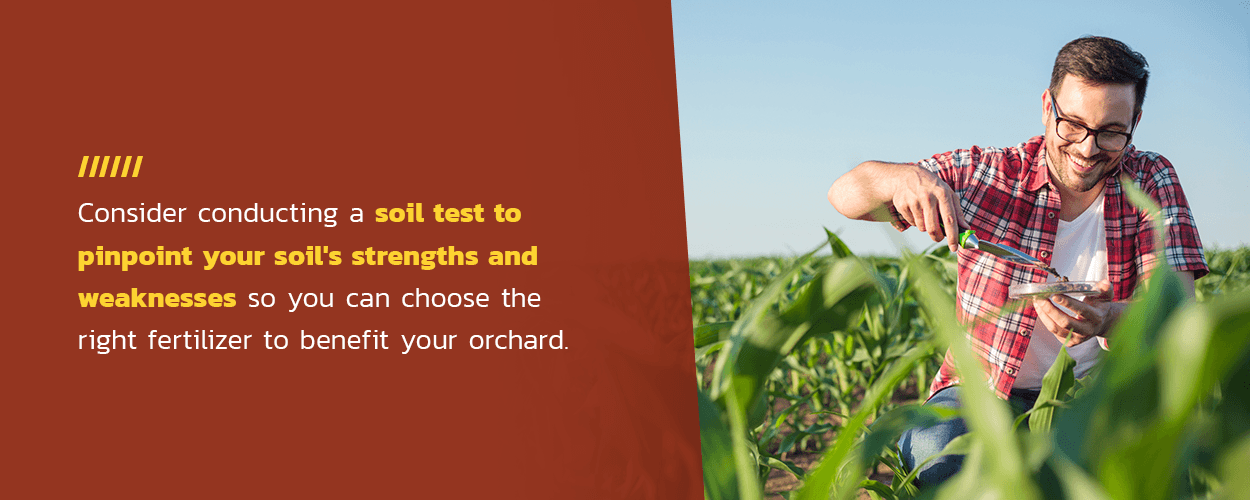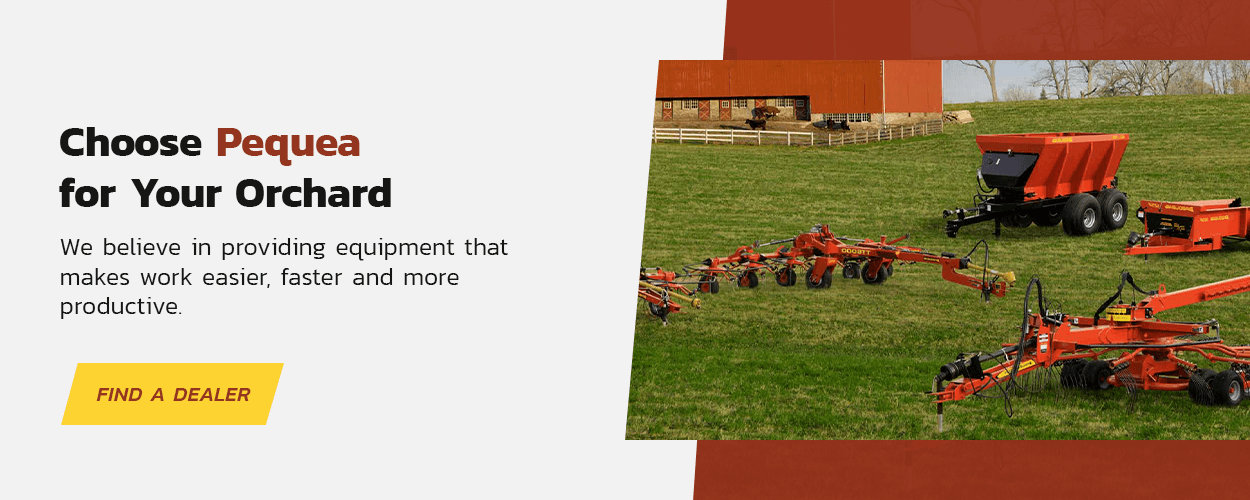The Best Orchard Fertilizers for Your Fruit Trees
Growing and maintaining an orchard is no simple feat. Even just growing a single fruit tree is delicate work. Choosing what kind of fertilizer you use for your orchard is a significant decision, but we've broken down the quintessential do's and don'ts of fertilizing your orchard.
What to Consider When Buying Orchard Fertilizer
Every plant and tree requires a specific combination of macronutrients to thrive. Specifically, they need a mixture of nitrogen (N), phosphorus (P) and potassium (K). This is known as an NPK ratio. Fertilizer labels display NPK ratios as three numbers (X-X-X), indicating the percentages of nitrogen, phosphorus and potassium within the fertilizer.
Each of these three macronutrients benefits your fruit tree in a specific way:
- Nitrogen encourages healthy foliage growth.
- Phosphorus stimulates root growth and blossom and fruit development when plants reach maturity.
- Potassium regulates your tree's metabolism.
It's important to remember that different trees require different NPK ratios, so do your research before choosing a fertilizer for your orchard.
Orchard Fertilizers to Avoid
When used incorrectly, nitrogen-rich fertilizers can injure your tree. Conventional nitrogen fertilizers contain salts. In high concentrations, these salts can keep your trees' roots from absorbing enough water. When choosing the right fertilizer for your orchard, determine how much nitrogen is currently in your soil and how much nitrogen your trees actually need.
When to Fertilize Your Orchard
The nutritional needs of fruit trees change with each season. Ideally, you want to begin fertilizing your orchard before trees break from dormancy, during late winter or early springtime. When temperatures start warming up, your fruit trees have a metabolic reaction that triggers growth, using energy reserves from the previous season.
When you feed an orchard fertilizer during the late winter to early spring months, you give your trees the energy they need to break from dormancy and grow blossoms and leaves. Adding fertilizer to your fruit trees a few weeks before they begin blooming allows enough time for the fertilizer to move down into the soil and reach the tree's roots.
You can continue fertilizing your fruit trees during summer, but it's best to stop when fall approaches. Fertilizing your orchard promotes growth, but you don't want those new buds and blossoms to be susceptible to the approaching cold weather. When you stop fertilizing your trees, you signal to them that it's time to stop growing and start entering dormancy.
The Best Fertilizers for Your Orchard
Different fruit trees require different NPK ratios and other nutrients and minerals. You need to understand your orchard's needs in terms of nutrients and minerals. Consider conducting a soil test to pinpoint your soil's strengths and weaknesses so you can choose the right fertilizer to benefit your orchard. Simple soil tests can be inexpensive, with rapid tests available so you can spend more time fertilizing your fruit trees.
Nitrogen-Rich Fertilizers
Nitrogen promotes the overall health of your fruit trees. From new growth to bearing fruit, nitrogen is key to your fruit trees growing to their full potential. Though nitrogen is abundant in the atmosphere, it's not always available in the proper form for plants. Nitrogen constantly needs replenishing in plants, so using a nitrogen-rich fertilizer is the best way to ensure the nutrient is readily available to your trees. A lack of nitrogen deprives your orchard of the proper nutrients to produce a healthy harvest.
Organic Nitrogen Sources
Look for fertilizers with these organic nitrogen sources:
- Blood meal: Blood meal prevents pests from damaging your trees and improves your soil. If your soil is phosphorus or nitrogen deficient, adding blood meal to your fertilizer will increase those levels.
- Soybean meal: Soybean meal is a balanced, organic fertilizer with a reasonable amount of nitrogen. It makes it a great addition to your fertilizer if you're concerned about having too much nitrogen.
- Composted chicken manure: Composted chicken manure is richer in nitrogen, phosphorus and potassium than other animal manures. Other manures contain about 1% nitrogen, 1% phosphorus and 1% potassium, while composted chicken manure contains 5% nitrogen, 3% phosphorus and 2% potassium.
- Cottonseed meal: Cottonseed meal aerates dense soil and helps retain moisture in soil with high concentrations of sand. It promotes healthy foliage and can increase crop production.
- Feather meal: Feather meal is a fantastic organic source of nitrogen, though it doesn't contain much else. It slowly releases nitrogen, rather than all at once, making it a beneficial addition to your fertilizer.
Specially Formulated Fertilizers
Specifically formulated fertilizers help your trees get the specific nutrients they need to thrive. For example, citrus trees require fertilizers with macronutrients that promote lush growth and fruit, like slightly nitrogen-rich formulas. Fertilizers specifically formulated for different fruits can save you from figuring out the correct NPK ratio you need for your orchard.
Compost
In addition to inorganic fertilizers, consider adding compost when fertilizing your orchard. Adding compost to your fertilizer is an excellent way to provide organic matter and trace minerals to your fruit trees. Compost also adds macronutrients and minerals that may not be in your typical fertilizer. Organic matter improves the structure and resilience of your soil and protects your trees against fluctuations in the soil's pH levels. Additionally, adding compost to your fertilizer can increase the surrounding soil's water-holding and buffering capacity. Organic matter in compost acts like a sponge, holding water in and releasing it slowly over time.
Use the Right Tools
Maintaining an orchard is no small feat. When fertilizing an orchard, use the highest quality tools to save time and resources.
At Pequea, we make our orchard and vineyard spreaders to fit within the tightest of rows, but we don't sacrifice load capacity for a slim profile. Pequea's GSN8 orchard spreader is our skinniest spreader, with a 7,200-pound load capacity. For even more versatility, try Pequea's LPV12 and LPV12G spreaders. Both spreaders include five removable attachment options and variable web and spinner speeds, allowing you to make adjustments to suit your orchard's needs.
Assets 
Choose Pequea for Your Orchard
Pequea understands the commitment and hard work that goes into farming and maintaining orchards. It's why we're dedicated to producing high-quality orchard spreaders for growers. We believe in providing equipment that makes work easier, faster and more productive. Find a dealer now to see what Pequea can do for your orchard, or browse our orchard spreaders online.

